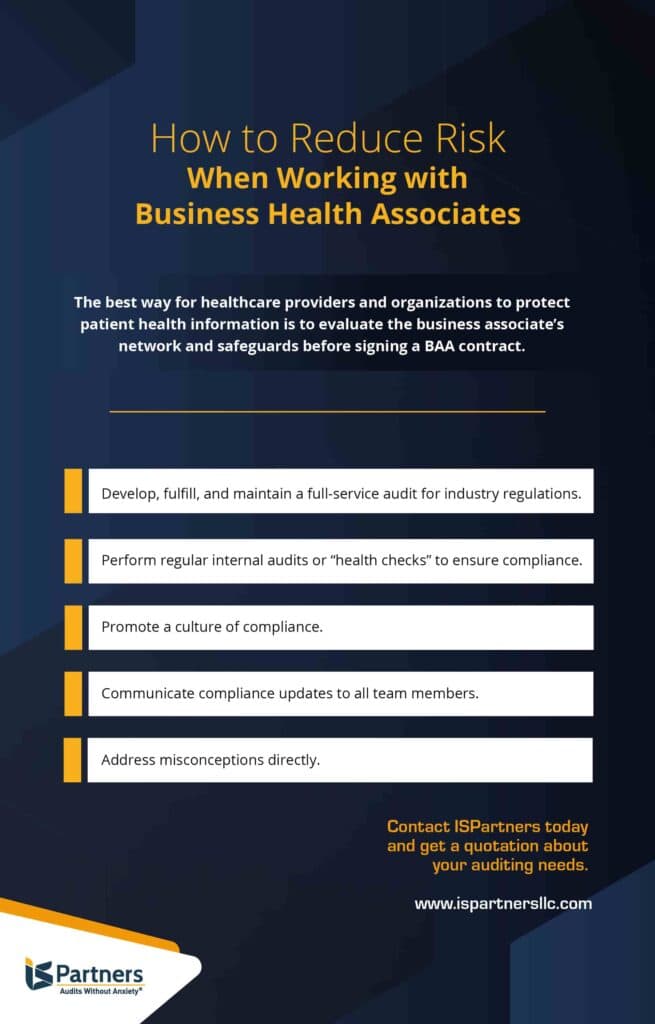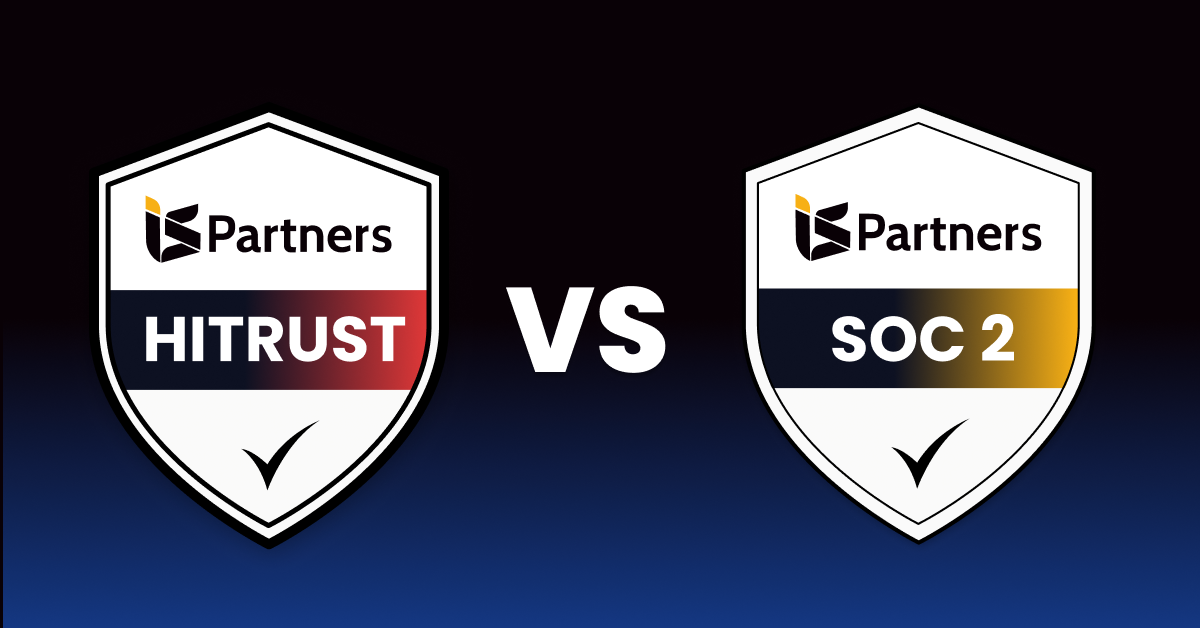As a healthcare provider or organization, your main goal is to provide quality medical care to help patients with their medical needs. Your organization will also require company business services to help your operations run efficiently. At some point, demand may surpass supply, which will require you to expand your services. One of the fastest solutions to this is to seek the help of business associates or third-party vendors.
An emergent problem to this solution is how to ensure that these entities will handle patient information with the same level of security as you do. One of the obvious answers to the risk queries of working with business associates is to follow and join initiatives that promote trustworthy vendors, such as the Health Third Party Trust or Health3PT.
The Health 3rd Party Trust (Health3PT) Initiative will manage directories, simplifying finding trustworthy vendors and speeding up the selection and contracting stages. This could benefit you and give your company an edge by letting potential clients know you meet their information risk management needs during the vendor selection process.
In this article, we walk you through the ins and outs of the Health3PT and how to reduce risks in working with business associates.
Key Takeaways
1. Health3PT refers to an initiative by a group of leaders in the healthcare industry aiming to resolve third-party risk issues through proper management and security controls.
2. Healthcare organizations can work with business associates to extend their services cost-effectively.
3. I.S. Partners can help healthcare organizations evaluate your business and third-party vendor’s compliance, such as for HIPAA, to ensure cybersecurity and risk management.
What is the Health 3rd Party Trust Initiative?
The Health 3rd Party Trust (Health3PT) Initiative is a group that aims to introduce standards, assurance models, and automated workflows to resolve third-party risk management issues and protect sensitive patient information.
Comprised of leaders from healthcare providers, insurers, and services, the Health3PT Council works together to share best practices in managing third-party risk and protecting sensitive information. The Health3PT Initiative is focused on creating a standardized approach for third-party risk management through collaboration with the industry and government.
Health3PT is supported by the HITRUST framework (an industry-recognized risk and compliance standards body) and CORL (a healthcare third-party risk management services and solutions provider).
The initiative has gained the support of national healthcare leaders. With members from major organizations such as HCA Healthcare, Humana, UPMC, Walgreens, and CVS, Health3PT emphasizes the importance of reliable, standardized assessments for vendors. Undergoing HITRUST certification helps vendors demonstrate their commitment to security and compliance, providing a competitive advantage and encouraging adherence to high standards to reduce data breaches and other security incidents.

What Are the Roles of Third-Party Risk Management in Healthcare?
Third-party risk management (TPRM) in healthcare involves a proactive approach to minimize the potential effects of cybersecurity threats. The activity involves comprehensive identification and analysis of risks and setting up control measures.
Third-party risk management is essential in healthcare because the industry’s digital transformation has made medical facilities more susceptible to third-party liabilities. The Ponemon Institute’s report showed that 54% of third-party respondents experienced at least one data breach involving PHI in the last two years, while 41% had six or more breaches within the same timeframe.
Implementing TPRM can help achieve the following aspects of cybersecurity:
- Identification of potential threats. Conducting a TPRM can help identify all potential threats that cannot be done through manual risk management. This aspect analyzes every aspect of the vendor and your security capabilities to hold and protect patient information.
- Compliance with regulations. TPRM helps ensure that vendors adhere to strict data security and privacy standards to protect patient confidentiality and comply with regulations such as HIPAA (Health Insurance Portability and Accountability Act).
- Vendor performance and quality assurance. A TPRM also helps set up evaluation methods to ensure the quality of third-party business associates’ services as part of vendor risk management in healthcare. It includes establishing service-level agreements (SLAs), key performance indicators (KPIs), and third-party risk metrics to monitor vendor performance and hold them accountable for meeting contractual obligations.
- Risk reduction and liability management. Effective TPRM practices help minimize legal and financial liabilities resulting from vendor-related incidents, protecting the organization’s reputation and bottom line.
Being a prime target for cybercriminals due to the value of patient data, the healthcare sector faced the highest number of incidents by industry in 2019, with 41% of facilities reporting a breach.
Vendors or business associates often hold PHI and other crucial data but may have weaker security and compliance measures than healthcare facilities. Without proper risk management, they become more vulnerable to attacks and compromises.
Why Is TPRM a Challenge for Healthcare?
Managing third-party risk in healthcare remains challenging as organizations increasingly outsource key functions to vendors.
The Cloud Security Alliance (CSA) cited several reasons for this, including:
- a lack of automation,
- costly and time-consuming risk assessments, and
- partially or undeployed critical vendor risk management controls.
The growing number of vendors handling sensitive data increases complexity in data stewardship, access management, and other areas. The pandemic-induced rapid digital transformation has amplified third-party risks as organizations adopted new technologies without fully considering security implications.
Since reverting to pre-pandemic practices is impossible, continuously expanding vendor ecosystems will present new risk challenges. Cybercriminals are aware of this, causing a rise in third-party data breaches in the healthcare sector.
Who Are Vendors in the Context of Health3PT?
In the healthcare industry, vendors refer to third-party companies or service providers that offer various products, services, or solutions to healthcare organizations. Vendors under the Health3PT can be considered Business Associates.
These vendors play a crucial role in the healthcare ecosystem by supporting key functions or processes, such as IT services, data management, electronic health records, billing and administrative services, medical equipment and devices, and cybersecurity tools.
Vendors often have access to sensitive information, such as protected health information (PHI), making their adherence to security standards and efficient risk management vital for the overall security and reliability of the healthcare sector.
What Are Business Associates in Healthcare Organizations?
In the healthcare industry, a business associate is an individual or entity your organization has agreed to work with and perform a certain function. Business associates are often given permission to handle patient health information.
Working with business associates allows healthcare organizations to expand their services while focusing on providing quality healthcare. Because associates are allowed to handle private information, agreements with them are bound by HIPAA regulations.
HIPAA-compliant business associates adopt the best privacy practices in handling patient information. A part of entering an agreement with business associates is complying with comprehensive information risk management requirements.
What is a Business Associate Agreement in Healthcare?
A business associate agreement (BAA) is a contract between a healthcare organization and a business associate that provides services or products. A business associate is defined as any company or entity working with the healthcare provider who may have access to patient health information.
Companies that can be business associates include
- CPAs,
- lawyers,
- consultants,
- claims administrators,
- pharmacy benefit managers,
- IT professionals, and a range of other companies.
In addition, if a business associate hires a subcontractor to perform work for the healthcare provider or organization, the subcontractor would also be considered a business associate due to their operations coming into contact with or working with patient healthcare information.
The BAA contract provides details regarding the reasons why the business associate must have access to patient health information and requires the business associate to provide the appropriate safeguards to keep the information secure. In addition, the BAA contract also lists the procedures that the business associate will take if there is a breach of privacy.
Any health organization or provider that is a HIPAA-covered entity and doesn’t have a required BAA contract with their business associates can face serious penalties. The federal government can impose civil monetary fines against you and/or levy criminal punishments.
What Are the Risks of Working with Business Associates?
Allowing entities other than the primary healthcare provider to handle patient information always poses a significant threat of breach to cybersecurity.
Patient information can be compromised if unmanaged properly and inadequate risk management is established. Working with business associates entails the following risks.
- Data breaches. The fact that business associates are permitted to access patient information makes them a clear target for cyberattacks. This is why, when entering a BAA, vendors must present a solid cybersecurity plan that must be at par with that of the healthcare organization.
- HIPAA violations. Entering a BAA must be guided by the HIPAA requirements. Failure to comply with HIPAA requirements, such as maintaining data privacy and security safeguards, can result in significant penalties, fines, and legal liabilities for both the business associate and the covered entity.
- Vendor management and oversight risk. Ensuring that business associates adhere to contractual agreements, regulatory requirements, and industry standards requires robust vendor management processes, regular assessments, and ongoing monitoring efforts.
- Vendor lock-in dependency. Healthcare organizations may become overly reliant on specific business associates for essential services or solutions, leading to vendor lock-in and dependency issues. Lack of vendor diversification and alternative options can limit flexibility, innovation, and negotiation leverage, potentially impeding organizational growth and competitiveness.
Despite the many risks, entering a BAA offers multitudes of benefits if handled properly. To mitigate these risks effectively, healthcare organizations must implement robust third-party risk management practices, conduct thorough due diligence when selecting business associates, and establish clear contractual agreements outlining responsibilities, expectations, and accountability mechanisms.
For the past several years, news of cyber-attacks has increased significantly. Cybercriminals are using new technologies to penetrate security protections in servers and networks to access personal information and accounts of customers working with businesses.
How to Reduce Risk When Working with Healthcare Business Associates
The best way for healthcare providers and organizations to ensure that patient health information is protected is to evaluate the business associate’s network and server safeguards before signing a BAA contract with them. The HIPAA-covered entity should ask about the procedures and policies that are already in place to protect patient information and who will have authorized access to such information when providing services and products.
Specifically, perform these activities as part of healthcare third-party vendor risk management:

- Hire experts with a good reputation. It always pays to perform a thorough background check on any aspiring business associate. Review their portfolio and the services they provide before hiring them and forming an agreement. Check their record on performing cyber risk management.
- Thoroughly assess vendors. Scrutinize the vendor’s security capabilities metrics. At a minimum, their security capabilities must at least match your organization’s. These measures must all be according to HIPAA requirements to ensure cybersecurity management. This step is also where you perform a risk assessment on your potential vendor.
- Establish clear contractual agreements. Develop comprehensive contractual agreements that outline roles, responsibilities, and expectations for both parties. Use concise contract language to promote uniformity. Include provisions related to data security, privacy, confidentiality, regulatory compliance, service levels, and liability. Ensure that contracts specify security requirements, such as encryption standards, access controls, incident response procedures, and breach notification obligations.
- Define and communicate security and compliance requirements. Clearly communicate security and compliance requirements to business associates and incorporate them into contractual agreements. Vague communication between the vendor and an organization results in unclear risk management outcomes.
- Regularly monitor and audit BA activities. Compliance is a continuous process. Establish an effective monitoring procedure that can be used to verify your vendor’s compliance with the set security details. Conduct periodic reviews, onsite assessments, and audits to assess security controls, data handling practices, and adherence to policies and procedures. Monitor access logs, security incidents, and compliance reports to detect and respond to any vendor-related security events.

Healthcare organizations are expected to work proactively to consistently reduce and control the risks of working with business associates. This task involves regularly updating security measures according to trends and revisions to regulations.
Consult with I.S. Partners, LLC. Our group of cybersecurity experts can help you evaluate third-party vendors and link you with the most trusted HIPAA-covered entities.
Healthcare Organizations Effectively Mitigate Risks Through IT Assurance Services
Protect your healthcare IT systems and prevent cybercriminals from accessing patient information by hiring an independent CPA firm. I.S. Partners provides IT solutions to the healthcare industry with a range of assessments.
As certified CPAs, we can perform HIPAA-HITECH audits and attestations to look for vulnerabilities in electronically protected health information systems and verify that your protocols and policies follow all HIPAA-HITECH regulations.
We also provide HITRUST assessments of business associates’ security requirements to ensure they align with HITRUST-CSF standards if the business associate seeks HITRUST certification. Contact us today to learn more about the audits and assessments we can provide to your health organization.




